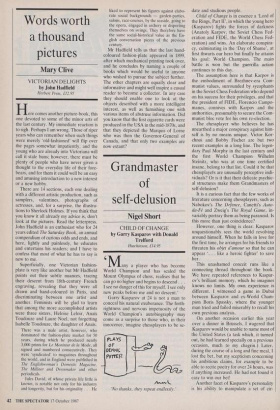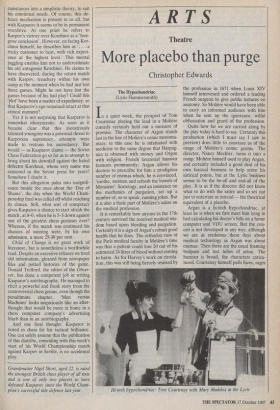Grandmaster of self-delusion
Nigel Short
CHILD OF CHANGE by Garry Kasparov with Donald Trelford
Hutchinson, £14.95
Many a player who has become World Champion and has scaled the Mount Olympus of chess, realises that he can go no higher and begins to descend. . . I see no danger of this for myself. I see only new peaks before me and no descent.'
Garry Kasparov at 24 is not a man to conceal his natural exuberance. The forth- rightness and nervous impetuosity of the World Champion's autobiography may come as a surprise to those who, in their innocence, imagine chessplayers to be se- 'No thanks, they repeat endlessly.' date and studious people.
Child of Change is in essence a 'Lord of the Rings, Part II', in which the young hero (Kasparov) fights the forces of darkness (Anatoly Karpov, the Soviet Chess Fed- eration and FIDE, the World Chess Fed- eration) and wins. An elaborate conspira- cy, culminating in the 'Day of Shame', at first thwarts our hero but finally he attains his goal: World Champion. The main battle is won but the guerrilla action continues to this day.
The assumption here is that Karpov is the embodiment of Brezhnev-era Com- munist values, surrounded by sycophants in the Soviet Chess Federation who depend on his success for their privileges, and that the president of FIDE, Florencio Campo- manes, connives with Karpov and the authorities, presumably to secure the Com- munist bloc vote for his own re-election.
The chessplayer who believes he has unearthed a major conspiracy against him- self is by no means unique. Victor Kor- chnoi and Bobby Fischer are but two recent examples in a long line. The legen- dary Paul Morphy in the last century and the first World Champion Wilhelm Steinitz, who was at one time certified insane, belong to that list. Could it be that chessplayets are unusually perceptive indi- viduals? Or is it that their delicate psychic- al structures make them Grandmasters of self-delusion?
It is a curious fact that the few works of literature concerning chessplayers, such as Nabokov's The Defence, Canetti's Auto- da-Fe and Zweig's The Royal Game, in- variably portray them as being paranoid. Is this more than just coincidence?
However, one thing is clear: Kasparov unquestionably sees the world revolving around himself. When he falls in love for the first time, he arranges for his friends to threaten his objet d'amour so that he can appear `. . . like a heroic fighter' to save her.
This unashamed conceit runs like a connecting thread throughout the book.
We have repeated references to Kaspar- ov's brilliant memory, which he imagines knows no limits. My own experience is different. I witnessed a game in Dubai between Kasparov and ex-World Cham- pion Boris Spassky, where the younger man tried and failed miserably to recall his own previous analysis.
On another occasion earlier this year over a dinner in Brussels, I wagered that Kasparov would be unable to name most of the United States (a task which, it turned out, he had learned specially on a previous occasion, much to my chagrin.) Later, during the course of a long and fine meal, I lost the bet, but my scepticism concerning his ambitious claims, for example to be able to recite poetry for over 24 hours, was if anything increased. He had not found it easy to win our bet!
Another facet of Kasparov's personality is his ability to manipulate a set of cir- cumstances into a simplistic theory, to suit his emotional needs. .Of course, this de- fence mechanism is present in us all, but with Kasparov it seems to be in permanent overdrive. At one point he refers to Karpov's victory over Korchnoi as a `fore- gone conclusion'. However, on facing Kor- chnoi himself, he describes him as . . a tricky customer to beat, with rich experi- ence at the highest level.' This mental juggling enables him not to underestimate his old antagonist Korchnoi. He claims to have discovered, during the return match with Karpov, treachery within his own camp at the moment when he had just lost three games. Might he not have lost the games because of his bad play? Could this 'plot' have been a matter of expediency, so that Kasparov's ego remained intact at that critical moment?
Yet it is not surprising that Kasparov is somewhat idiosyncratic. As soon as it became clear that this monstrously talented youngster was a potential threat to Karpovian supremacy, attempts were made to restrain his ascendancy. But would — as Kasparov claims — the Soviet Chess Federation go so far as to attempt to bring about his downfall against the hated defector Korchnoi, whose very name was censored in the Soviet press for years? Somehow I doubt it.
But this allegation pales into insignifi- cance beside the ones about the 'Day of Shame', the day when the World Cham- pionship final was called off whilst reaching its climax. Still, what sort of conspiracy gives Kasparov a chance to start afresh the match, at 0-0, when he is 5-3 down against one of the greatest chess geniuses ever? Whereas, if the match was continued his chances of winning were, by his own admission, a mere 25-30 per cent.
Child of Change is no great work of literature, but is nonetheless a worthwhile read. Despite an excessive reliance on tired old information, gleaned from newspaper files and potted histories of the game, Donald Trelford, the editor of the Obser- ver, has done a competent job in writing Kasparov's autobiography. He managed to elicit a powerful and frank story from the controversial chess genius, even though the penultimate chapter, 'Men versus Machines' looks suspiciously like an after- thought that would be more at home in a chess computer company's advertising blurb than in an autobiography.
And one final thought: Kasparov is noted in chess for his tactical brilliance. One can safely assume that the publication of this diatribe, coinciding with this week's start of his World Championship match. against Karpov in Seville, is no accidental ploy.
Grandmaster Nigel Short, aged 22, is rated the strongest British chess player of all time and is one of only two players to have defeated Kasparov since the World Cham- pion's successful title defence last year.



























































 Previous page
Previous page